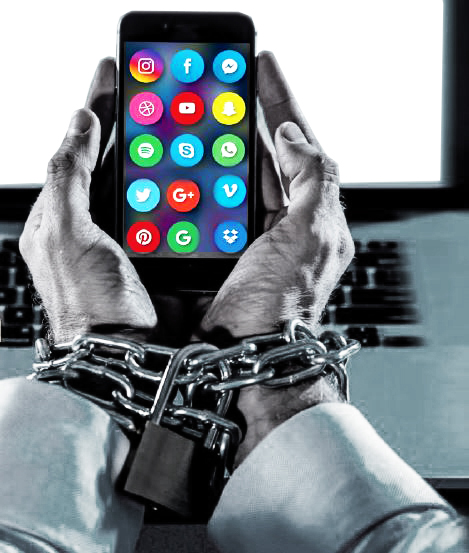…𝒐𝒏 𝒂𝒏 𝒂𝒗𝒆𝒓𝒂𝒈𝒆 𝑩𝒉𝒖𝒕𝒂𝒏𝒆𝒔𝒆 𝒔𝒑𝒆𝒏𝒅𝒔 163 𝒎𝒊𝒏𝒖𝒕𝒆𝒔 𝒆𝒗𝒆𝒓𝒚 𝒅𝒂𝒚 𝒐𝒏𝒍𝒊𝒏𝒆 𝒄𝒐𝒎𝒑𝒂𝒓𝒆𝒅 𝒕𝒐 𝒕𝒉𝒆 𝒈𝒍𝒐𝒃𝒂𝒍 𝒂𝒗𝒆𝒓𝒂𝒈𝒆 𝒐𝒇 145 𝒎𝒊𝒏𝒖𝒕𝒆𝒔
Tenzin Lhaden
With the first portable cell phone initiated in 1973 by Motorola, cell phones became popular during the cellular revolution which started in the 90s and by 1990; the number of mobile users was around 11 million. By 2020, this number grew to a whopping 2.5 billion.
There are 553,600 social media users and 744,000 cellular mobile users in Bhutan as of January, 2022. About 90.5% of people are active members of at least one social media platform/app (application-software). Bhutanese spend an average of 163 minutes every day online compared to the global average of 145 minutes. “When we saw this statistics, we saw there was a deep concern in educating people,” said Kesang Tshokey, Program Officer, Children’s Division of the National Commission for Women and Children (NCWC).
“Intensive users of social media are Generation Z (age 13-29), Millennial (age 30-44), people with university degrees, and employed citizens, with each category spending four or more hours every day. These generations are experiencing very strong technological digital advancement with an influx of information coming from all over the world which may not necessarily be productive,” she said.
In consequence, Bhutan InfoComm and Media Authority (BICMA) have taken certain steps. BICMA has put in place Rules and Regulations on Content 2019 which ensures good practice and standards of content disseminated by the Bhutanese ICT and Media Service Provider to the society. These regulations require content providers to ensure that any content provided by them is within the context of good taste, and decency, and is appropriate for consumption. It also helps empower content providers and ensure accountability while encouraging creativity and innovation in the development and dissemination of quality content through self-regulation.
However, Kesang said, “The biggest problem which we foresee are parents giving their child mobile phones because now they think mobile phones are the best babysitters where you don’t have to be near them to babysit. Well this is dangerous. We have the technological capacity to do that, but we are not technologically informed or educated on having an influx of information.”
In other countries, parental control apps are installed. “When their child is looking into their phone or website, any information that may be harmful will be filtered, but our people don’t use that app and before we know it the child has picked up so many violence things from online,” she added.
For instance, in the Chinese TikTok app, if content pops in and you watch it for more than 20 seconds, then the app already recognizes that you watch such content and they throw out more information related to such contents. In their country, the Chinese kids have access only to educational information such as ABCD, 2+2, and so forth, but to the rest of the world, we can actually see people dying as well from dangerous TikTok contents.
Late last year, Bloomberg reported that the blackout challenge was linked to the deaths of at least 15 children aged 12 or younger since early 2021, with another five children aged 13 or 14 also dying during that period.
A 14-year-old boy from Queensland told 7NEWS last year that he participated in the challenge after seeing his friends do it. But the teenager vows to never do it again after one of his friends ended up in hospital.
That is something the general public should know. “When NCWC goes out, we talk with housewives, young mothers and rural communities; they are totally unaware of such issues and they say, “We don’t know such things happened to children”. So, there is a very strong need for advocacy and it is a must,” Kesang added.
In accordance with, the erstwhile Media Council, now merged with BICMA has constantly notified the general public to refrain from engaging with unauthorized and inappropriate content on social media.
The Council has extensively worked towards sensitizing and educating the general public, especially the vulnerable sections of the population, on the responsible usage of such platforms and raising awareness on the equivalent threats associated with online activities and how to stay safe online, according to the BICMA.
“One of the internationally proven best practices to tackle such content in social media is by educating the masses on responsible use and making them aware of the existing laws and regulations of the country. Therefore, to make the virtual community safe and secure for all, especially the vulnerable sections of the population, this year too, we are working on developing an advocacy video on the ‘role of parents in the age of social media’ which shall also be aimed at creating a healthy and literate society and on promoting safe and healthy use of Social Media,” the BICMA stated.
They said they have also been educating the general public on how to report inappropriate content on social media platforms through educational materials such as posters and info-graphics and have also instituted a reporting mechanism for receiving and addressing complaints related to content.
“We are committed to ensuring that Bhutanese citizens, especially the younger generation, are safe and protected while using the internet and other ICTs. We have taken several steps to regulate online content and raise awareness to enhance online safety and digital literacy amongst its users and will continue to monitor and regulate online activities to ensure a safe and secure online environment for all,” said the BICMA.
What did a widely known as ‘Father of the cell phone’ Martin Cooper said on cellphone addiction?
He said that he found it ‘devastating’ when he sees people crossing roads while looking at their mobile phones. “They are out of their minds,” and jokingly added, “After a few people get run over by cars, they’ll figure it out.” He also added, “Privacy is a very serious problem, addiction is a problem,” acknowledging the ills of his creation.

 BHUTAN TODAY The New Perspective
BHUTAN TODAY The New Perspective
